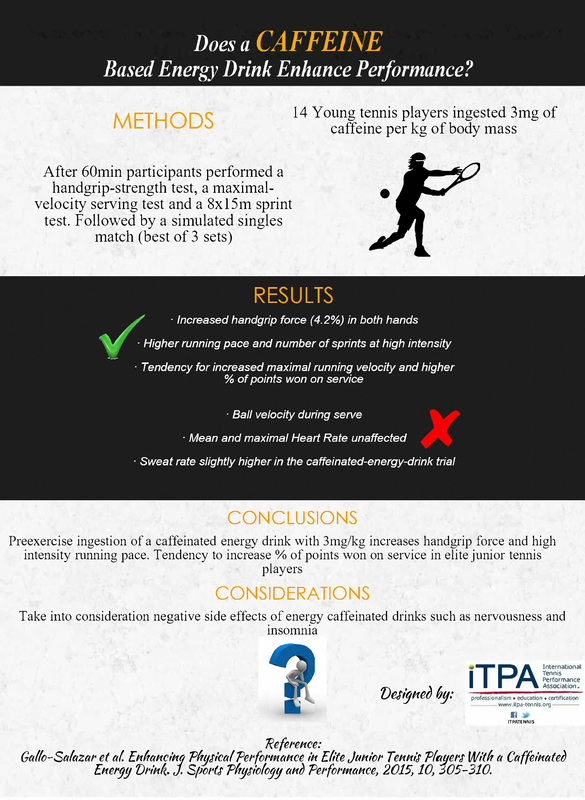Caffeine has been shown effective as an ergogenic aid in other sports involving high intensity intermittent actions like soccer, rugby sevens and rugby. Its effectiveness has been related to a reduced perception of exhaustion among other mechanisms such as increasing total running distance, lower limbs power output and increased upper body muscle performance.
Frequently, elite junior tennis players have much pressure to accomplish great results at a short age apart from educational obligations and many training hours a week. Added to this, energy drinks constitute a big part of this population’s consumption and are popular in their inner circle. It’s important for parents and coaches to be aware of the effects of commercially available energy drinks on junior tennis players and their performance during competition.
Studies such as Gallo-Salazar et al. (2015) give us an idea of caffeine implications in tennis players’ performance. 3mg of caffeine per kg of body mass in the form of an energy drink and after 60min to allow its absorption results in increased hand grip force (4.2%) in both hands, in addition to a higher running pace at high intensity (being this considered 18km/h or more) and a larger number of sprints during the match. As a result of these performance parameters, simulated game shows a higher tendency in percentage of points won when serving having ingested caffeine in comparison to placebo. On the other hand, ball velocity wasn’t improved during serve.
This gives us a clear vision of a better performance in some determinant physical aspects we find in tennis. Caffeine could be a nutritional aid to increase some factors associated with tennis success as was confirmed for adult population in previous studies and sports.
Nonetheless, as we all know, the most popular way of caffeine consumption is coffee. This makes us wonder if ergogenic properties remain while consuming caffeine through its most popular form. Studies like Hodgson et al. (2013), give us some hints about this matter. Although it’s not specifically focused on tennis players, trials were performed on athletes comparing coffee consumption, decaffeinated coffee, placebo and caffeine alone. After testing parameters such as average power output and performance times, differences were shown between the placebo/decaffeinated drink and coffee/caffeine drink, showing no significant differences between the two last. This concludes that in certain sports and situations caffeine intake in the form of coffee can be as effective as its consumption in the form of a prepared drink. Studies should focus on specific tennis situations and variety of ages/levels to be completely sure about this matter.
However, tennis coaches, parents, strength and conditioning coaches and nutritionists should be aware of negative side effects these kinds of drinks could induce. Other studies have revealed that some athletes report nervousness and insomnia hours after caffeine consumption. It’s a valid nutritional strategy to increase certain physical performance but must be assessed responsibly. First of all and before considering ergogenic options it’s essential to have a hydration and nutrition routine and/or guide to avoid risks and injuries. The consumption of appropriate fluid volumes before, during and after tennis play is essential to maintain performance.
Following indications provided by Kovacs (2008) we find that tennis players can sweat more than 2.5 liters per hour of play and replace fluids slower during competition than practice. In warm environments electrolyte enhanced fluids should be consumed on a personalized schedule, but somewhere between 200mL - 440mLper changeover is usually required. Nevertheless, coaches, parents and scientists need to individualize protocols and establish a hydration strategy.
References:
Gallo-Salazar et al. Enhancing Physical Performance in Elite Junior Tennis Players With a Caffeinated Energy Drink. International Journal of Sports Physiology and Performance, 2015, 10, 305-310.
Kovacs, M. A review of fluid and hydration in competitive tennis. International Journal of Sports Physiology and Performance, 2008, 3(4): 413-23.
Hodgson, A; Randell, R; Jeukendrup, A. (2013). The metabolic and performance effects of caffeine compared to coffee during endurance exercise. PLoS ONE 8(4) e59561. doi:10.1371/journal.pone.0059561





 RSS Feed
RSS Feed
